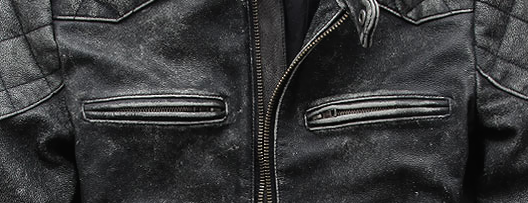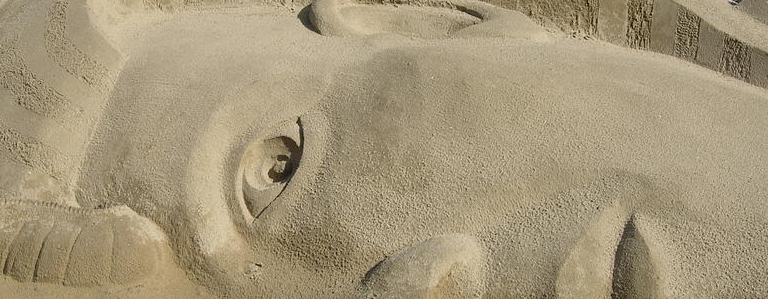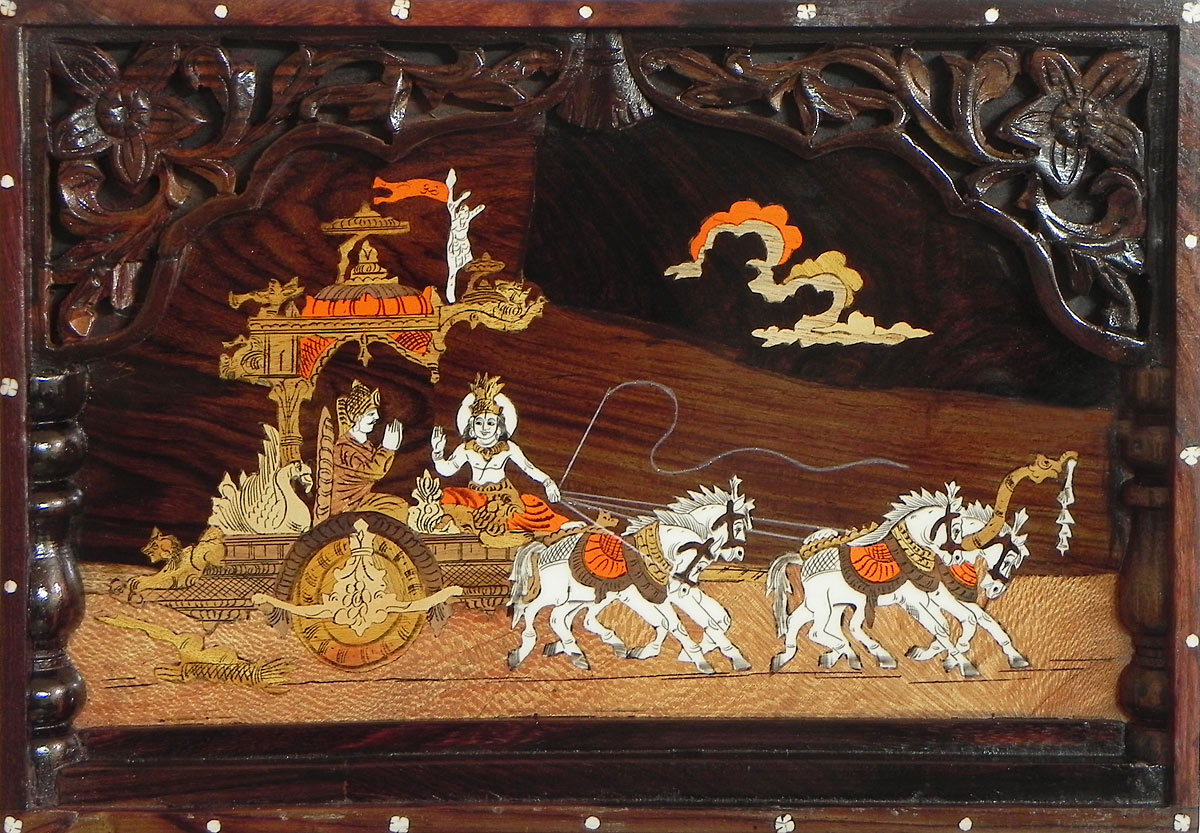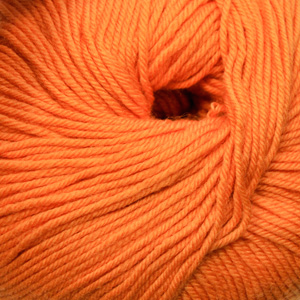
Men's motorcycle jacket, displayed for sale. Photo credit >
GLAMOUR
I like to take long drives and one of my favorites is heading north from Los Angeles on the 5 freeway, then turning off at the 126. That road runs east and west and goes through the Sespe Valley. It's a narrow valley with low hills I feel I could touch. It’s cozy and I feel protected. The valley is beautiful, especially driving east to west. Everything is green — the miles of orange and avocado groves, flowers grown for commercial use, other fruits and vegetables, many of which are sold at two big fruit stands along the road. The city is very far away. The road goes all the way to the ocean at Ventura but I usually turn around before that, at Santa Paula, which I think of as the town that time forgot. The main street looks as it must have fifty years ago; gentrification is not a word spoken here. Sometimes I stop and have some tacos but usually I just drive through slowly, making sure nothing has changed.
One day, as I was leaving the 5 for the 126, I noticed a motorcycle and its driver pulled over to the side of the road. He was sitting on the bike, dressed all in black leather and just as I was passing him he pulled off his helmet and shook out long blonde hair. My god, I thought, the quintessential California image — man, motorcycle, black leather, blonde hair. Then I thought, no, it isn't just a California image — anyone anywhere would respond to him. For the moment it took me to pass him, he was Brando and the Hell's Angels and the two guys from Easy Rider and Harley Sunday drivers — everyone who has ever hit the road on two wheels heading somewhere else.
I thought about him as I drove on and wondered where he was going. I didn't want to meet him; I wanted to gaze at him, to be in the presence of the charisma I saw in an instant. As I kept picturing him, I realized I was feeling a kind of low grade awe, the kind that makes you feel you're connected to something important. Then it came to me, a word — glamour. He was one of the most glamorous images I'd ever seen. Glamour means allure, it instills fascination, it has a mystique. It compels us to stare. The motorcyclist had the glamour of the loner — the cowboy riding the range, the detective going down mean streets, the surfer riding the face of a towering wave with ease and grace, the motorcyclist pulling over to the side of the road and shaking out his long blonde hair.
There is a reason those images are iconic. They’re about courage and a certain nonchalance in the face of risk. They touch something primal in us – the desire to test ourselves, to go it alone, to ride into the unknown. I may not have the chance to do any of that soon, but gazing at the motorcycle rider I sense what it must feel like. His glamour comes from knowing it firsthand.

'Cumulus at sunrise over the Atlantic, near the Canary Islands.' © Antonio Martín, Cloud Appreciation Society member 11,271.
UNPREDICTABLE CLOUDS
Yesterday, the NY Times had an article about the wonderfully named Gavin Pretor-Pinney who started something called the Cloud Appreciation Society. He'd been spending some time in Rome and as he looked at frescoes and religious paintings he noticed they were filled with clouds, masses of the soft billowing kind, but outside the Roman sky usually had very few clouds.
He was in Rome because he needed time off from publishing a magazine in London called "The Idler." He called it "literature for loafers" and advocated aimlessness, letting the imagination wander. In Rome, he thought about the clouds in the paintings and the cloudless sky and just got interested.
Back in London, he began a detailed study of clouds and talked to everyone about them. Eventually, a friend invited him to give a lecture and, in trying to come up with an alluring title, he called it "The Inaugural Lecture of the Cloud Appreciation Society." The lecture room was packed and afterwards many people asked him how they join the Society. He had to admit there wasn't one but soon fixed that. He created a website where people can post photos of clouds, trade information and, in exchange for $15, get a membership badge, a certificate and a cloud a day sent to their inbox. There are now 40,000 members from all around the world. He's written a book about clouds that's been a great success and now his life is all about clouds.
There are so many reasons to love this story. The fact that this man noticed clouds and wanted to know about them. His passion for what is possibly the most ephemeral thing in Nature, never fixed, always changing. He didn't second guess himself or wonder what other people would say about his eccentric interest. He just went with it and a world of science, art and literature, not to mention people, opened up to him. Who could have predicted how far the simple act of noticing clouds would take him? Or that people all around the world would share his interest?
Unpredictability. Sometimes, when I become interested in something, I censor myself. I become self-conscious about what other people will think or I decide where things will go and how my efforts will turn out. Yes, disappointing things I couldn't have predicted often come to pass. This is such a common occurrence there are common phrases for it: man proposes and God disposes. Or from John Lennon: life is what happens to you while you're busy making other plans. We don't always get what we want. But this man's story shows that the opposite is also true. You don't know where things will lead and sometimes the unpredictable is a welcome surprise, even better than what you had in mind.
What a rich world the cloud man created. He found it because nothing was holding him back.

Ozymandias. >
A TASTE OF HONEY
I sometimes find myself in an Ozymandias moment, thinking about our misguided belief that the more power we accumulate, the greater the monuments we construct, the more we’ll guarantee our own immortality. "My name is Ozymandias, king of kings, Look on my works, ye mighty, and despair!" In Shelley's poem, those words are carved on a fallen pedestal, half buried in shifting desert sands. Here is an irony; despite our boasting and pretensions, our arrogant belief that what we build will last forever, through time and the unfolding of history, everything can, and probably will, be brought low.
There are times, though, when the poem leads me in another direction, something quite the opposite of arrogance and futility. I think about the fact of death, how we all know we are walking toward it, and the likelihood that all we are and have and know will be covered over by those shifting sands. And even so, and nonetheless, we do build and create, we surround ourselves with art, construct morality, we procreate, we cultivate compassion, we sacrifice, and above all, we love. It's the grandeur of the human spirit, our capacity to create the deepest meanings right alongside our knowledge of what's coming, to find those meanings despite our knowing that death is ahead.
Tolstoy tells the story of a man who is being chased by a dragon. The man sees a well and jumps into it, thinking to save himself. But by the time he's already falling, he realizes there's a monster at the bottom waiting for him. He grabs at a branch growing out of the wall and hangs on to it, suspended between the dragon above and the monster below. Then the man sees a white mouse and a black mouse nibbling away at the base of the branch, and he knows that sooner or later the branch will give way and he will fall. But then he notices there is a drop of honey on one of the branch's leaves, and despite the certain fate the man knows awaits him, he reaches out to lick the honey.
That is our glory: we reach for the honey.

'Lord Krishna Preaching Gita to Arjuna During Kurukshetra War.' Inlaid Wood Wall Hanging. >
THE FRUITS OF ACTION
I came across some lines from the Bhagavad Gita, the Hindu book that Gandhi loved and read throughout his life. The god Krishna appears to Arjuna, a warrior who on the eve of battle suddenly becomes reluctant to go to war. The enemy army is a clan in which Arjuna has many relatives — how can he bring himself to kill them? On the other hand, if he doesn't fight he is leaving his own army without a leader and they will killed by the enemy clan. Krishna urges Arjuna to fight but Arjuna says that will bring bad karma to his soul. Krishna says, "It is not possible not to act. But it is possible to act without creating karma. One does this by performing all action without hatred or desire. Be intent on action, not the fruits of action . . . action imprisons the world unless it is done as a sacrifice. Free from attachment, perform action as a sacrifice."
I imagine Gandhi immersed for a lifetime in this book that is ostensibly about going to war. Krishna is saying that you must detach from anger and hatred and not focus on whether your actions succeed or fail. Think only of the importance of acting. "Action imprisons the world" . . . action that is all about success and failure, and your own needs and expectations, action that comes out of ego, can only lead to pain and suffering. Let go of attachment. Become selfless in the sense that your actions aren't attached to your ego — they're focused on something greater than you and performed for a greater good. "Perform action as a sacrifice."
Selflessness and self-sacrifice — they are among the ideals we value the most. They're universal — they're at the heart of Buddhism, Christianity, Judaism and Islam. They're just as highly valued in the secular world. We admire the person who rushes into a burning building to save a child, or the person who performs an act of kindness without desire for thanks or acknowledgement. We admire actions that are detached from self-interest. The first section of Viktor Frankl's book, Man's Search For Meaning, is a memoir of his time in a concentration camp. He says, "The best of us did not come back." The ones who, even in that inhuman world, managed to care for others, or shared what little food they had, those who sacrificed their own survival — they are the best of us.
In the camps, survival often depended on a person's ability to remain intact, grounded in a deep sense of self and one's humanity, which was the very thing the Nazis wanted to exterminate. This gets to a paradox: only those with a strong, secure sense of self can act selflessly and be ready to sacrifice. When you are deep in ego, when your sense of security depends on the outside world, you are too bound up in self to think of another; desires and demands, needs and expectations block out the light of compassion for the world and the desire to connect with something or someone beyond yourself.
Finally, Krishna tells Arjuna to focus all his actions on him. In this, he is the universal god who says in many traditions and languages, "Give all your doubts, pain and suffering to me. Focus on me and you will expand yourself."

MY BIG ORANGE SWEATER
I knit myself a sweater a few years ago. The wool yarn is a deep orange, flecked with yellow and brown. I didn't use a pattern; my sweater is very long and wide so I don't have to worry about it fitting, and so warm if a blizzard ever comes to Los Angeles I'm definitely prepared.
A few months ago, I noticed that moths had gotten to the yarn. There were a number of holes, one of them so big I wasn't sure it could be mended. I bordered on bereft; it wasn't fair that something I was so proud of, loved so much was damaged by little flying creatures that for some reason had targeted me. I shook out the sweater, put it in a plastic bin with some moth balls (which is what I should have done in the first place) and there it sat for weeks.
I didn't forget the sweater — I kept seeing those holes, so big I couldn't wear the sweater and hope no one would notice. Somehow, leaving the sweater in that state felt sacrilegious; this was my work, I'd put in the hours and hours it took to make it — if I didn't honor all my effort, it would be because I so little valued myself. I saw it clearly and knew it was true.
I found a reweaver and took the sweater in. Mending it was expensive but my self-esteem was at stake so I left it at the shop. I picked it up today and it looks great. If the two women who own the business hadn't left markers of where the mends were, I never would have found them.
I'm looking at the sweater now and am amazed to realize I feel something like joy. If I hadn't taken it to be mended, I can feel precisely the guilt I'd have every time I passed the closet and thought about the sweater in its moth-eaten state. I'm thinking now about all the times I've let things slide, been too lazy or too full of what's-the-point depression to do the ordinary maintenance everyone has to do. But I've been trying to do better and this time I did. I took care of my sweater. I took care of myself.
This article first appeared in The Journal of Wild Culture, October 12, 2016.

SHERRY SONNETT'S WILD CULTURE SCRIBBLER'S QUESTIONNAIRE
1. What is your first memory and what does it tell you about your life at that time and your life at this time?
My earliest memory is of my mother bending over my crib with a cigarette in her mouth. This image is so emblematic of our relationship that I sometimes feel I must have made it up. But it has the feel of a real memory. (Talking about how we know the different feel of a memory, a dream, a fantasy would make for a great conversation.) My mother never really saw me and, needless to say, I’ve struggled all my life to accept what she couldn’t give me and learn what I can give myself.
2. Can you name a handful of artists in your field, or other fields, who have influenced you — who come to mind immediately?
Ruth Rendell is the first that comes to mind and I’m sure it’s because of her incredible productivity which I’ll never have. Dickens who could create a full character in only a few sentences and wasn’t afraid of sentiment. And many others; if I’m moved by a book or painting or sculpture it’s probably burrowed into my brain and set up its tents there.
But most of all, Helen Keller. That moment when she connects the signs that Annie Sullivan has been making on the palm of her hand, to something real, water. That is the most moving scene I can imagine. With that connection, with the learning of words, she realizes there is a life outside herself. In that one moment, she is given the world.
Where did you grow up, and did that place and your experience of it help form your sense about place and the environment in general?
I grew up in Teaneck, New Jersey, a bedroom suburb of New York. It was perfectly ordinary and in high school that became the problem. My friends and I worked to “Ban the Bomb,” and instinctively knew racism was wrong. Those things gave me a sense of the world beyond my town. I couldn’t wait to leave it.
4. If you were going away on a very long journey and you could only take four books — one art book, one fiction or poetry, one non-fiction, one theory or criticism — what would they be?
Only four books??? Well, Shakespeare, of course, because he would keep me endlessly occupied. The art book: Michelangelo. The power in that stone feels holy to me. Non-fiction? Hmm . . . Maybe Norman Mailer’s Armies of the Night because it’s about the time of my time, and reminds me of youth and ideals and the sense that we could do anything — even levitate the Pentagon. Or, one even better, Varieties of Religious Experience by William James. His voice is the most generous and tolerant I know of, and always inspires me. As to theory, this stumps me, so I’d probably choose someone I haven’t read before.
5. What was your most keen interest between the ages of 10 and 12?
Between 10 and 12, I read Nancy Drew and anything else that came my way. And I also loved to build models of cars and planes which turned out not to look at all like the picture on the box lid.
6. At what point did you discover your ability with writing?
I always wrote, although I had no sense that what I wrote was any good. I couldn’t call myself a writer because 'writers' were in some universe beyond me. But one memory stands out. I was pretty much grown, 19 or 20, and I was having one of the elaborate fantasies I often had when it suddenly occurred to me that I was writing fiction. This must be what writers do, and I was doing it. Wow!
7. Do you have an ‘engine’ that drives your artistic practice, and if so, can you comment on it?
Mostly, my engine sputters. I’ve done my best work when nothing was pushing me to do it. But there have been long silences. I wish I was one of those writers who work at it every day (Ruth Rendell, Philip Roth, Joyce Carol Oates — she can’t really be human! — and many others). I guess I have my own pace and nothing changes it much.
8. If you were to meet a person who seriously wants to do work in your field — someone who admires and resonates with the type of work you do, and they clearly have real talent — and they asked you for some general advice, what would that be?
To a young writer: read, read, read. Think about a book’s language, structure, how the characters are drawn — in short, read to learn how a writer creates a book.
9. Do you have a current question or preoccupation that you could share with us?
My current question is how to get freer and freer of the things that block me, in life and in writing. And how best to get that journey down on paper.
10. What does the term ‘wild culture’ mean to you?
Wild Culture . . . Free and unafraid. The sound of a flamenco dancer at fever pitch. Untameable art and ideas. Subversive. Sets off the wildness in all of us.
11. If you would like to ask yourself a final question, what would it be?
By final question, I assume you mean on my death bed. I think it will be something along the lines of, did I do the work I was meant to do? Was I as willing as I could be to learn the lessons of change. And most naturally — why is life so short?

SHERRY SONNETT is a journalist, screenwriter and author of two children's books and a novel published in 2013, Restraint. She has a masters degree from Harvard Divinity School where she focused on consciousness and how we invest meaning and value in the world. About her habitation, she says, “I love living in Los Angeles”.
This article first appeared in The Journal of Wild Culture on October 28, 2017.

Comments
Your stories are stories I
Your stories are stories I will want to read again and again and pass on. I think of them as gems of unwavering strength and original beauty because your voice is clear and certain of your self speaking. You are a writer who people will love to read.
Add new comment